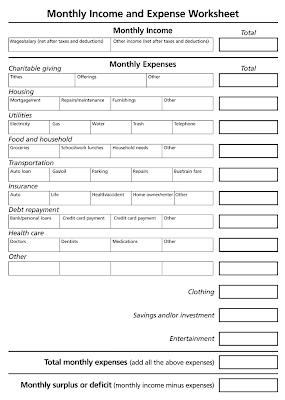The first step in designing a personal spending plan—a budget —is to determine your net worth. In other words , find out your overall financial condition. Begin with a list of your assets: possessions (and their fair market value) that you own and could sell.

download here
Then make a list of your debts: the amounts you owe to creditors (banks , mortgage companies, stores , credit cards and the like) .
Subtract your total indebtedness (the total of your debt list) from your assets (the total monetary value of your asset list) and you have your net worth: a summary of your financial condition.
If the combination of your assets and debts is a positive number,you have a positive net worth. If it is a negative number, you are in debt.
If you have a significant amount of debt , regardless of your net worth , you need to prepare and follow a budget that will help you improve your financial picture.
After determining your overall financial condition, the second step is to analyze your monthly cash flow. This will show you which direction you are headed—whether you are accumulating money, holding steady or going further in debt. You can do this by examining your monthly income and expenses.
Subtract your total indebtedness (the total of your debt list) from your assets (the total monetary value of your asset list) and you have your net worth: a summary of your financial condition.
If the combination of your assets and debts is a positive number,you have a positive net worth. If it is a negative number, you are in debt.
If you have a significant amount of debt , regardless of your net worth , you need to prepare and follow a budget that will help you improve your financial picture.
After determining your overall financial condition, the second step is to analyze your monthly cash flow. This will show you which direction you are headed—whether you are accumulating money, holding steady or going further in debt. You can do this by examining your monthly income and expenses.
  | |||
| download from Ancora Imparo |
If you have money left over at the end of the month after pay in all your expenses (including housing, food, clothing, utilities , transportation , insurance, taxes and recreation) , your net worth is increasing, and you should have money to save or invest.
Here are a few things to consider about some typical expenses:
Education
One of the first issues to consider in a financial plan is education Although obtaining a college degree or certification in a particular trade costs money, this expense is almost always one of the best investments we can make. On average, people with higher education and market able job skills consistently earn more money.
Managing debt
Going into debt is generally not a good idea. “ The borrower is servant to the lender”. The difficulty with debt is that , in addition to paying back the principal (the amount borrowe d ) , we also have to pay interest on the outstanding balance.
Over the course of a typical 30-year loan for a house, for instance, the borrower pays more than double the purchase price of the house, with the additional money going to pay the interest on the loan.
Be cautious before committing yo u rself to any debt. Debts we cannot immediately repay have a way of compounding our financial problems.
Buying a house
In addition to costs associated with buying a house, such as a down payment (often 10 or 20 percent of the purchase price) and mortgage fees , you should also consider maintenance costs and taxes.
Other factors you should consider when purchasing a house are the local market and the location.
Transportation
Owning an automobile is a wonderful convenience, but it can consume large portion of any household or personal budget. Considering the costs of fuel, insurance, repairs and car payments , if you cannot purchase a vehicle outright automobile expenses can quickly add up to a significant amount.
Because of these costs, using public transportation (buses,trains, etc.) may be a better choice. Although not as convenient, this option is generally less expensive.
Food
The cost of food is a significant portion of a household budget. In general ,purchasing basic commodities in bulk and preparing meals at home is cheaper than buying highly processed items and eating out at restaurants.
Clothing
Everyone must have clothes , yet this area also provides opportunities for economy. A planned wardrobe vs. impulsive buying is much easier on clothing budgets. Purchasing good - quality but traditionally styled, clothing will often be the most economical approach in the long run .
Insurance
Many types of insurance are available today — life, home, automobile and health.Since a wide variety of insurance is available, we have to consider our individual circumstances in making decisions about the kinds and levels of insurance we need.
Savings
Last but not least, let’s consider savings. Although savings are often considered a luxury or afterthought, they should be included in every household budget. The reason is simple:
Emergencies and unexpected expenses will always arise. When we have savings to cushion the blow, the effects of these surprises are not as devastating. From this perspective, saving is simply delayed spending.
If you are not meeting your expenses , you need to make adjustments so you can pay your bills. Next episode in What with adjusting your bills?




No comments:
Post a Comment